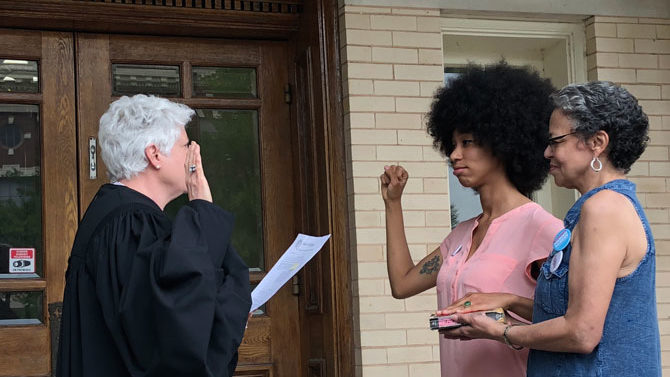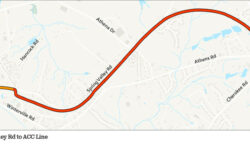Contrary to jazz musician Gil Scott-Heron’s belief, the revolution will be televised—on government access channel 180.
Athens politics-watchers got a taste of the Central Committee voters elected last month when Mariah Parker became the first of the batch of five new leftist commissioners to be sworn in. (Parker’s race was a special election because Harry Sims resigned his seat to run for mayor. The rest will take office in January.)
Parker opted to hold two swearing-in ceremonies. The second was a more traditional one inside the commission chamber just prior to the commission’s June 5 voting meeting. The first—a combination spoken-word performance and political rally—took place a half-hour earlier on the City Hall steps.
The 26-year-old hip-hop artist and linguistics student burst outside and led a crowd of about 100 supporters in a chant of, “Ain’t no power like the power of the people, ’cause the power of the people don’t stop.” Right hand clenched in a black-power fist, she took the oath of office from Probate Court Judge Susan Tate on a worn copy of The Autobiography of Malcolm X held by her mother.
Like the rest of the slate of commissioners elected in the May Revolution—Patrick Davenport, Tim Denson, Russell Edwards and Ovita Thornton, as well as incumbent Melissa Link—Parker ran on a platform of economic and social justice, racial equity, ending discrimination and alleviating poverty. One of her first votes was against Athens-Clarke County’s fairly noncontroversial fiscal 2019 budget. It was a symbolic vote, for sure, considering she didn’t work on the budget and therefore had no stake in it, and that the other eight commissioners present voted for it. But it also brought home that the local political discourse is about to change in a big way.
Parker thanked the other commissioners for their hard work, but “I don’t personally feel comfortable voting for a budget that currently apportions funds for a criminal justice system that punishes people for cannabis possession and inability to pay cash bail, that disproportionately punishes black and brown people in our community, as well as a budget that nickel-and-dimes the captive ridership that are taking advantage of our public transportation system, in lieu of each of us paying into a system that works equitably for everyone,” she said.
Observers saw a glimpse of the future in a couple of votes involving the West Hancock Avenue corridor, too.
A partial moratorium on demolition and construction in that neighborhood expired last month because the commission didn’t have a quorum to vote on extending it. The extension was back on the agenda June 5. Commissioner Melissa Link, who represents the area, asked for a 12-month extension. That would buy more time to conduct a study to suggest zoning changes to a historic neighborhood threatened by intense commercial development, gentrification and real-estate speculation.
“We’re starting to see that play out,” Link said. “We’re starting to see some development interest and multiple demolition permits requested for this neighborhood. There is no clear process on how to move forward.”
Commissioner Allison Wright suggested eight months, which Link accepted. Commissioner Mike Hamby made a substitute motion for five months, which Link objected to, asking for seven instead.
Under questioning by Commissioner Jerry NeSmith, Manager Blaine Williams said that five months would not be long enough to act on the study’s recommendation. It would likely be completed in November, setting up a December work session and a vote in January or February, he said.
Hamby stuck to his guns. “At some point, the work has to get started, and it has to get started quickly,” he said.
Link noted that the downtown master plan committee hasn’t met in more than two years. “I don’t trust that we’ll act quickly on any study,” she said. The comment seemed to get under Hamby’s skin, as he spent much of the rest of the meeting enumerating all of things in the downtown master plan that have been accomplished.
The vote on the five-month extension was 7-1, with Parker opposed and Link abstaining. Although no one would say it, the significance of the length is that it will be the current mayor and commission—not the one that will take over in January—that will ultimately decide whether to let developers have their way with West Hancock Avenue.
Commissioners used the shortness of the moratorium they had just approved as a reason to block changes Link wanted to make to the scope of the $15,000 study, to be conducted by UGA’s Carl Vinson Institute of Government. Link suggested requiring the Vinson Institute to meet with the West Broad Initiative steering committee (a group that studied a broader area including West Hancock), incorporate the West Broad Feasibility Study (which included neighborhood improvements, though none in the neighborhood covered by the moratorium), mail surveys to residents and present the results at a public meeting. “This needs to be a very inclusive and professional process,” she said.
Other commissioners scoffed at those suggestions. Wright said they’d have to rebid the contract. (Technically, it was never put out for bid; it’s an intergovernmental agreement between ACC and UGA.) “There’s definitely scope creep here, and Ms. Link, if you want to delay, this is how to do it,” NeSmith said. Again, the vote to move forward with the study as-is was 7-1, with Parker opposed and Link abstaining.
Parker and Link also joined forces on a vote on the controversial Clayton Street streetscape project, in which the commission settled on a schedule that will keep the street open this fall and during the fall of 2019, when retailers are busy with football crowds and holiday shoppers. Although ACC did eventually host public input sessions last spring after initially approving construction plans with little opportunity for input, Link continued to object to the lack of public input on the project. She and Parker both voted “no.” When the other four new commissioners join them behind the rail, though, it’s easy to see how some of those 7-1 and 7-2 votes might turn into 6-4 votes the other way.
Like what you just read? Support Flagpole by making a donation today. Every dollar you give helps fund our ongoing mission to provide Athens with quality, independent journalism.









